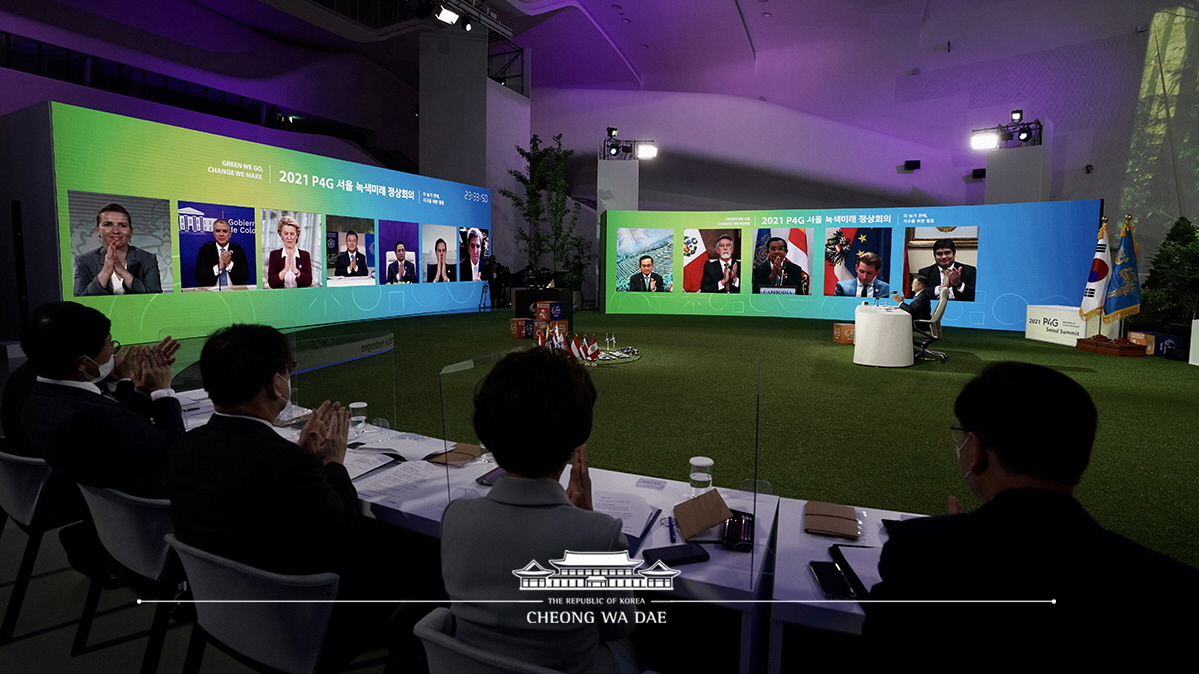이 웹사이트는 제19대 대통령 임기 종료에 따라 대통령기록관이 「대통령기록물 관리에 관한 법률」에 의해 이관받아 서비스하는 대통령기록물입니다. 자료의 열람만 가능하며 수정 · 추가 · 삭제는 불가능합니다.
다만, 「개인정보보호법」에 의하여 개인의 정보를 보호받기 원하시는 분은 관련 내용(요청자, 요청내용, 연락처, 글위치)을 대통령 웹기록물 담당자(044-211-2253)에게 요청해 주시면 신속히 검토하여 조치해 드리겠습니다. 감사합니다.
SPEECHES & REMARKS
BRIEFINGS

Honorable heads of state and government,
The goal of carbon neutrality is to make a sustainable green future possible. As this goal is attainable only if all of humanity makes steady efforts together, its measures for implementation should also be sustainable. A reliance on coercion, discipline or good will cannot guarantee continued participation from the public and businesses. We should turn the carbon neutrality goal into an opportunity to foster new industries and create jobs. In this way, people from every walk of life will come to see the merits of the cause. At the same time, businesses will voluntarily begin developing technology and making relevant investments.
To this end, the Republic of Korea is pursuing a Green New Deal as one of our most prioritized national projects and intends to inject US$65 billion in government spending by 2025. The focus of this policy is primarily placed on eliciting the private sector’s vibrant participation and providing support for efforts to innovate. Concrete outcomes have already begun to emerge. In Sinan, Jeollanam-do Province – one of Korea’s marine ecosystem treasure troves – local residents, governments, businesses and labor have come together to create the world’s largest offshore wind farm that can generate 8.2 gigawatts of electricity. The residents participating in this project will have shares and receive a specified portion of the profits. This can be referred to as a resident-inclusive offshore wind farm.
Ulsan, a city emblematic of Korean industry, is building a floating offshore wind farm that can generate 6 gigawatts of electricity and a facility to produce green hydrogen, both of which will utilize structures built to extract natural gas in the middle of the sea. Over the next decade, these two projects alone are forecast to attract about US$75 billion in investments and help create 330,000 jobs. I hope that Korea’s Green New Deal will become a good model as it involves local residents and businesses cooperating and is backed by the central and local governments.
Climate issues have no borders. It is crucial for advanced and developing countries to band together while understanding each other’s different socio-economic conditions. As advanced countries did in the past, developing countries have no choice but to rely on fossil fuels for industrialization and economic growth. Therefore, the path toward carbon neutrality is very challenging for them. Advanced countries should increase support to help shoulder the burdens that developing countries face.
The Republic of Korea will serve as a bridge between advanced and developing countries to bolster international solidarity and cooperation. While actively responding to the climate crisis together with advanced countries, Korea will help developing countries secure eco-friendly technologies through the Climate Technology Centre and Network, which opened in Incheon’s Songdo District last year, and the Green Technology Center in Seoul. We will work with developing countries to help them secure financial resources and strengthen their capabilities by expanding our climate-related ODA and establishing a Green New Deal Trust Fund through the Global Green Growth Institute.
The shipping and shipbuilding industries should also participate in reducing greenhouse gas emissions. Shipping should become greener and ships more eco-friendly. At the ASEAN-Republic of Korea Commemorative Summit held in Korea in 2019, Korea agreed to strengthen cooperation in managing marine debris. This year, we started carrying out a project to enhance the Philippines and Indonesia’s capabilities to manage marine debris. I once again urge the United Nations to begin discussions on how to respond to marine plastics.
I hope that Korea’s endeavor to build public-private partnerships and promote international cooperation will hasten the steps that the entire world is taking to respond to the climate crisis and achieve carbon neutrality.
Thank you.



